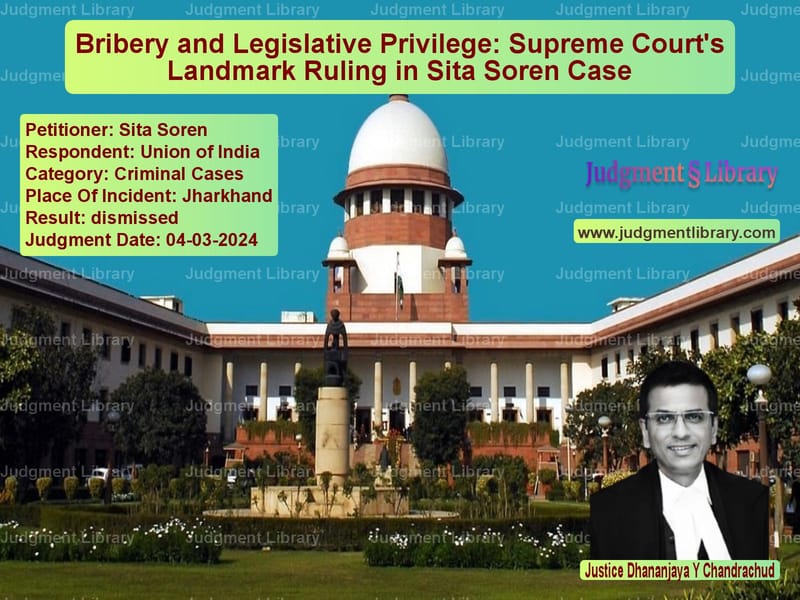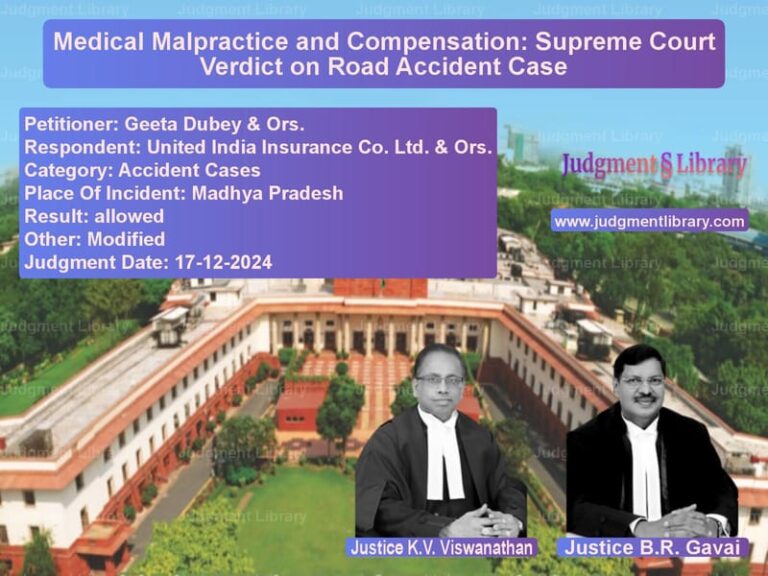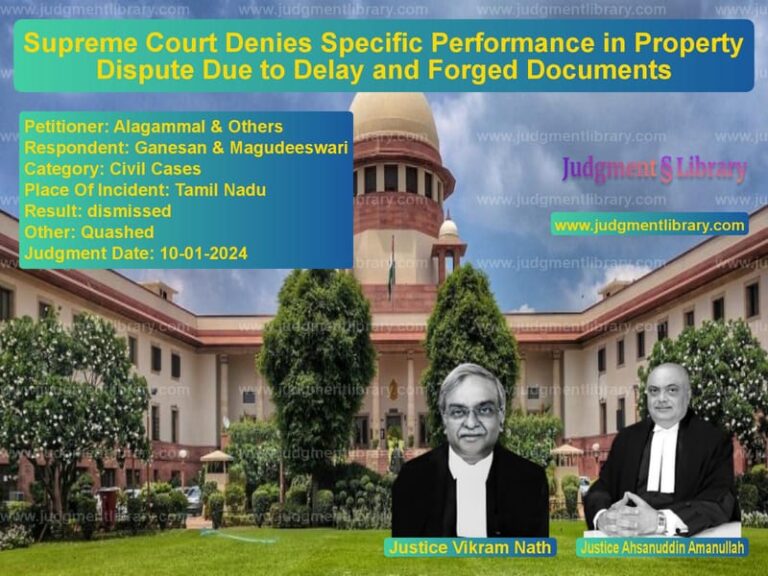Bribery and Legislative Privilege: Supreme Court’s Landmark Ruling in Sita Soren Case
The Supreme Court of India recently delivered a crucial judgment in the case of Sita Soren v. Union of India, addressing the contentious issue of bribery within the legislature and the extent of parliamentary privilege under Articles 105 and 194 of the Indian Constitution. The case revolved around whether an MLA accused of accepting a bribe in exchange for voting in a Rajya Sabha election could claim immunity under parliamentary privilege. The Court revisited the precedent set in P.V. Narasimha Rao v. State (CBI/SPE) and redefined the scope of immunity available to legislators.
Background of the Case
The case originated when Sita Soren, a Member of the Jharkhand Legislative Assembly, was accused of accepting a bribe from a candidate contesting the Rajya Sabha elections in exchange for her vote. She was charged under the Prevention of Corruption Act, 1988, and relevant sections of the Indian Penal Code (IPC). In her defense, she claimed that her vote was part of her legislative duty, which was protected under Article 194(2) of the Constitution.
However, the Jharkhand High Court dismissed her claim for immunity, holding that accepting a bribe was an independent criminal offense that could not be shielded by legislative privilege. Aggrieved by this decision, she approached the Supreme Court, seeking protection under the doctrine of parliamentary privilege.
Petitioner’s Arguments
The legal counsel representing Sita Soren put forth the following arguments:
- Legislative Privilege under Article 194(2): The petitioner contended that her act of voting in the Rajya Sabha election was an extension of her legislative duties and was therefore protected under parliamentary privilege.
- Reliance on P.V. Narasimha Rao Judgment: The petitioner cited the 1998 ruling in P.V. Narasimha Rao v. State, where the Supreme Court had held that MPs were immune from prosecution for bribery if it was connected to their voting in Parliament.
- Independence of Legislators: The defense argued that prosecuting legislators for their votes would create a chilling effect and interfere with their independence in legislative matters.
- Non-Justiciability of Legislative Conduct: The petitioner submitted that the judiciary should not interfere in matters related to voting within the House, as it falls exclusively within the domain of the legislature.
Respondent’s Arguments
The Union of India and the Jharkhand government strongly opposed the claim of parliamentary privilege and countered with the following points:
- Bribery is a Criminal Offense: The government argued that accepting a bribe was an offense under the Prevention of Corruption Act and could not be justified under legislative functions.
- Distinction between Vote and Bribery: The respondent clarified that while casting a vote in the legislature is a protected act, taking money for a vote is an independent criminal act that falls outside the scope of parliamentary immunity.
- Public Interest and Constitutional Morality: The prosecution emphasized that allowing bribery to be shielded under privilege would violate the basic principles of democracy and accountability.
- International Jurisprudence: The respondent referred to rulings from the UK, USA, and Canada, where bribery by legislators was treated as a criminal act rather than a privileged legislative function.
Supreme Court’s Observations
The Supreme Court, after carefully examining the case, made several significant observations:
- Bribery is Not a Legislative Function: The Court held that bribery does not constitute part of a legislator’s duties and is therefore not covered under Article 194(2).
- Distinguishing P.V. Narasimha Rao Case: The Court clarified that while Narasimha Rao’s case protected acts within the legislative chamber, it did not extend immunity to criminal acts preceding or following such acts.
- Constitutional Morality and Rule of Law: The judgment emphasized that constitutional privileges should not be misused to protect corruption within the legislature.
- Public Trust in Democratic Institutions: The ruling highlighted that shielding bribery under parliamentary privilege would erode public confidence in democratic institutions.
Key Judicial Remarks
The Supreme Court made strong statements against the misuse of legislative privileges:
“Bribery is not protected by parliamentary privilege. The constitutional provisions ensuring immunity for legislators do not extend to criminal acts committed outside the legitimate functions of legislative duties. Accepting a bribe to cast a vote in an election is not an act in furtherance of the legislative process.”
The Court further stated:
“While legislators must be protected in the exercise of their duties, this protection does not extend to acts that are inherently criminal and erode the very foundation of democratic governance.”
Final Judgment
Based on its findings, the Supreme Court ruled:
- The petition was dismissed.
- The prosecution of Sita Soren under the Prevention of Corruption Act and the Indian Penal Code was allowed to continue.
- The earlier judgment in P.V. Narasimha Rao v. State was partially overturned to the extent that it granted immunity for bribery related to voting in elections.
Implications of the Judgment
This ruling has far-reaching implications:
- Reinforces Accountability: The judgment ensures that legislators cannot use parliamentary privilege to shield themselves from corruption charges.
- Strengthens Anti-Corruption Laws: It affirms the constitutional principle that bribery in any form is a punishable offense.
- Sets a Precedent for Future Cases: The ruling will guide lower courts in handling cases involving corruption within the legislature.
- Promotes Democratic Integrity: It restores public faith in the legal system by ensuring that lawmakers are held accountable for unethical conduct.
Conclusion
The Supreme Court’s decision in Sita Soren v. Union of India is a landmark judgment that clarifies the limits of parliamentary privilege. By holding that bribery is not protected under legislative immunity, the ruling upholds the principles of democracy, accountability, and the rule of law. This judgment is expected to serve as a deterrent against corruption in electoral processes and strengthen India’s democratic framework.
Petitioner Name: Sita Soren.Respondent Name: Union of India.Judgment By: Justice Dhananjaya Y Chandrachud.Place Of Incident: Jharkhand.Judgment Date: 04-03-2024.
Don’t miss out on the full details! Download the complete judgment in PDF format below and gain valuable insights instantly!
Download Judgment: sita-soren-vs-union-of-india-supreme-court-of-india-judgment-dated-04-03-2024.pdf
Directly Download Judgment: Directly download this Judgment
See all petitions in Fraud and Forgery
See all petitions in Public Interest Litigation
See all petitions in Bail and Anticipatory Bail
See all petitions in Judgment by Dhananjaya Y Chandrachud
See all petitions in dismissed
See all petitions in supreme court of India judgments March 2024
See all petitions in 2024 judgments
See all posts in Criminal Cases Category
See all allowed petitions in Criminal Cases Category
See all Dismissed petitions in Criminal Cases Category
See all partially allowed petitions in Criminal Cases Category







